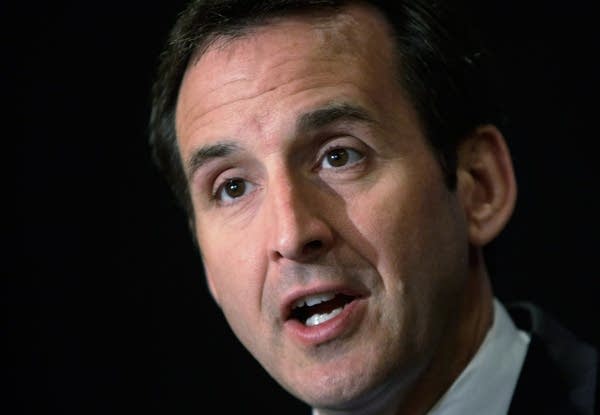Pawlenty proposes health care changes
Go Deeper.
Create an account or log in to save stories.
Like this?
Thanks for liking this story! We have added it to a list of your favorite stories.

Pawlenty has long been a supporter of giving consumers more control of their health care spending. He said cutting paperwork and time will save consumers money, and the best way to do that is to give people online access to their own medical records; things like doctor visits, medical history and prescription use.
"I think it will be a significant breakthrough in the way that we share, maintain and deliver medical information in our state," he said.
Pawlenty announced that every state employee would have online access to their own so-called personal health portfolio by 2009, and he hopes that everyone in Minnesota could have the same access by 2011.
The governor said the system would save time and money for both consumers and medical professionals. He said an individual could click a mouse and send his or her records to a doctor, a hospital or pharmacy instead of waiting for a medical clerk to pack it up and send it in the mail.
Turn Up Your Support
MPR News helps you turn down the noise and build shared understanding. Turn up your support for this public resource and keep trusted journalism accessible to all.
He said it could also improve treatment because doctors would have immediate access to a person's medical information.
"For a consumer to be able to easily access their health care records in an instant, electronic, user friendly, easy to understand format is nearly impossible," he said. "It's nearly impossible. And so we have an opportunity to improve that and to show a better and brighter path."
Pawlenty said it would cost about $600,000 for the state to create the secure Web site. He also insisted that the site won't be released until he is assured that it is secure and added that the data would not be available unless a state employee chooses to enroll in the system.
The concept of creating an electronic medical records system isn't new. In fact, HMOs, hospitals and doctors have been working for the last several years to put nearly all medical records online. But what is new is giving the patient access to those records.
Several companies, like Microsoft, have systems that store an individual's health information.
James Mault is the director of Microsoft's Health Solutions Group, which runs the online system known as HealthVault. He said people will become more comfortable with storing medical records once they know the system is secure. He compared it to online banking.
"There will always be a risk," he said. "The beauty of it is that, over time, you will see an ecosystem of programs and services of things that you can do with your health information, and even save your life, by having your information electronically that will, in a relative way, that will start to far out weigh the concern."
Mault didn't say how Microsoft would make money from HealthVault, but several reports said online advertising would be the main economic driver for Microsoft and other companies working on the systems.
Mault said Microsoft is working with outside privacy groups to ensure that their system meets security standards. He added that the company won't sell any data to outside groups.
Deborah Peel, with the consumer advocacy group Patient Privacy Rights, praised that move. She said her group is looking at HealthVault and other health storage sites to see if they meet privacy standards.
Peel said consumers should do their homework before they sign up for a personal health portfolio. She said many companies make their money by selling the data to outside groups.
"The sales of health data are worth billions of dollars a year," she said, "so we're telling people that you better be extremely careful in choosing a personal health record because a large majority of them will use their data and sell it."
The governor also announced that all state employees will get a $250 reimbursement account to cover out-of-pocket costs.
He said he is doing it because the state employee health plan is doing better than expected. He hopes the debit card would reduce paperwork for all state employees.
Minnesota's private HMOs have also agreed to provide the cost of procedures like X-rays and lab tests online so consumers can see which providers offer common procedures at the lowest price.
Rep. Paul Thissen, DFL-Minneapolis, praised Pawlenty for proposing initiatives that would make the health care payment system more transparent, but said the governor shouldn't stop there. He said the governor should better address increasing health care costs and lack of access.
"When I talk to people across the state, I'm hearing about affordability of health care," he said. "I'm hearing about access to quality doctors and I'm not sure that these proposals standing alone get us there."
Thissen said the governor and Legislature addressed some of those concerns in the last legislative session, and he is optimistic they can do more when lawmakers return next year.




